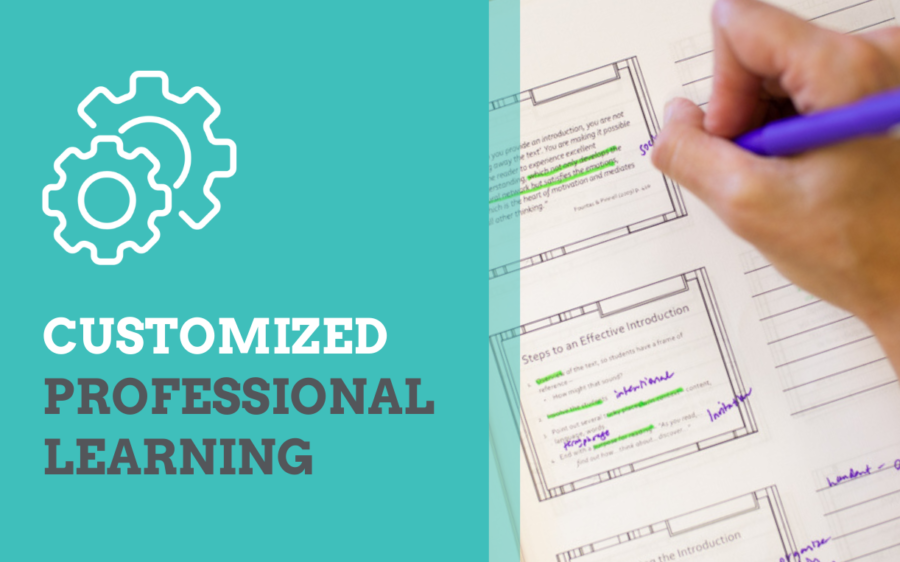
- This event has passed.
August 10, 2020 @ 9:00 am – August 14, 2020 @ 3:30 pm
Word Study: Teaching Phonics, Vocabulary, and Spelling in Grades 3-8

Learn how word study fits into a broader language and literacy framework.
In this 5-day training for teachers, learn the importance of instruction in vocabulary, spelling, and word analysis skills in the intermediate grades and middle school.
- Classroom Teachers, Interventionists, & Specialists
- Literacy Coaches & Teacher Leaders
- Literacy Collaborative Affiliation Discount available
- Additional fees for graduate credit
Word study provides students with an opportunity to engage in inquiry and actively work with words to understand how they work. In word study, students expand their knowledge in the areas of word learning and become more flexible and automatic when reading and writing increasingly more complex words.
In this course, you will learn how to assess, plan, and teach effective word study lessons, as well as connect students’ work in this part instructional context to opportunities across the literacy day.
Examine the teaching of phonics, spelling, and vocabulary in an authentic literacy classroom for grades 3-8. Investigate essential categories of learning. Analyze teaching and engage in inquiry to deepen your understanding of how words work. Come away with a set of instructional practices for effective teaching across a range of students.
Course Outcomes
- Support with remote learning
- Understand the relationship between phonics, spelling, and vocabulary, and how students develop competencies over time
- Explore categories of word learning: letter/sound relationships, spelling patterns, high frequency words, word meaning/vocabulary, word structure, and word-solving actions
- Demonstrate knowledge of foundational language systems: phonology, morphology, and orthography
- Examine the importance of word consciousness and how to nurture in students an awareness, interest, and curiosity of words
- Build knowledge of how to provide explicit inquiry-based instruction that helps all students, including those who are learning the English language; develop essential understandings of how words work
- Differentiate word study teaching to address varying strengths and needs and assure the success of English language learners and students who may need additional support
You can take this course for noncredit and earn 35 professional development hours, or you can take it for 3 graduate credits.
Required Texts
You are responsible for purchasing/having access to the following professional texts for this course:
- Fountas, I.C. & Pinnell, G.S. (2017). The Fountas & Pinnell comprehensive phonics, spelling, and word study guide. Portsmouth, NH: Heinemann Publishing.
- Fountas, I.C. & Pinnell, G.S. (2017). The Fountas & Pinnell literacy continuum, expanded edition: A tool for assessment, planning, and teaching. Portsmouth, NH: Heinemann Publishing.
- Rasinski, T., Padak, N., Newton, R.M., & Newton, E. (2008). Greek & Latin roots: Keys to building vocabulary. Huntington Beach, CA: Shell Education.
Required Readings
You are responsible for purchasing/having access to the following readings for this course:
- Joshi, R. M., Treiman, R., Carreker, S., & Moats, L. C. (2009). How words cast their spell: Spelling is an integral part of learning the language, not a matter of memorization. American Educator, Winter 2008-2009, 6-16 & 42-43.
- Fountas, I. C. & Pinnell, G. S. (2020). Twelve Compelling Principles from the Research on Effective Phonics Instruction. Portsmouth, NH: Heinemann.
Recommended Texts and Readings:
- Beck, I. L., McKeown, M. G., & Kucan, L. (2013). Bringing words to life: Robust vocabulary instruction. 2nd. Ed. New York, NY: The Guilford Press.
- Cobb, C. & Blachowicz, C. (2014). No more “look up the list” vocabulary instruction. Portsmouth, NH: Heinemann.
- Crosson, A. C. & Lesaux, N. K. (2013). Connectives: Fitting another piece of the vocabulary instruction puzzle. The Reading Teacher, 67(3), 193-200.
- Fountas, I.C. & Pinnell, G.S. (1998). Word matters: Teaching phonics and spelling in the reading/writing classroom. Portsmouth, NH: Heinemann.
- Fountas, I.C. & Pinnell, G.S. (2009). Words matter: Building power in vocabulary. In When readers struggle: Teaching that works (pp. 152-173). Portsmouth, NH: Heinemann.
- Graves, M. F., August, D., & Martinez-Mancilla, J. (2013). Teaching vocabulary to English language learners. New York, NY: Teachers College Press.
- Rasinski, T., Padak, N., Newton, R. M., & Newton, E. (2011). The Latin-Greek connection: Building vocabulary through morphological study. The Reading Teacher, 65 (2), 133-141.
- Templeton, S. (2002). Effective spelling instruction in the middle grades: It’s a lot more than memorization. Voices From the Middle, 9(3), 8-14.
Cancellation Deadline & Refund Policies
Non-credit
You must cancel in writing two weeks before the start of the course to get a refund, minus a $50 processing fee. Email CRRLC@lesley.edu to cancel. If you are unable to attend, you may send a substitute at any time. Regardless of weather conditions, if the event is held but you cannot attend, you will be billed for the full amount.
Graduate Credit
Review the university’s cancellation and refund policies for credit bearing courses.
Requirements for Participation
After the training, you will receive a certificate of attendance for your participation. To receive a complete certificate, participation during the specified times is required. Additional work may be assigned to meet the professional development hours.
Graduate Credit Option
With additional assignments and fees, this course can be taken for 3 graduate credits. To participate in this course for graduate credit, you need to be teaching in a classroom in grades 3–8 or have access to a small group of students you can work with over time. Contact CRRLC@lesley.edu to register for credit.
- $1,990 ($650*/credit + $40 registration fee) *subject to change
- Course number: EEDUC 6049.34
With Your Colleagues Option
We can deliver this training to your school/district. This option can be delivered virtually or in-person for a group within your school/district (as COVID-19 social distancing guidelines allow).
Fees & Policies
- Fees are determined by the number of participants and the duration of training.
- If applicable, travel expenses for each trainer (airfare, hotel, meals, and rental car) are an additional cost to be paid by the district.
- Professional development sessions that require extensive travel or overnight stays (if applicable) may incur an additional surcharge.
- If the number of participants exceeds the maximum, another trainer may be needed. This will increase training costs and travel expenses.
- Unless otherwise noted, fees do not include the cost of any required books or materials. The faculty trainer will consult with the district to select books based on the topics and the district’s needs.
- School districts in the same geographic area participating in the same training may combine their resources to meet participant minimums. Payment must be on one district’s purchase order.
For detailed costs, complete our online form to request this training for your school/district and we will contact you.
Interested in professional learning at your school or district? Schedule a meeting with one of our faculty trainers.
“The instructor was full of knowledge and asked questions that lifted our thinking and learning. She helped to make the theory practical.”
Literacy Coach (Anonymous)



